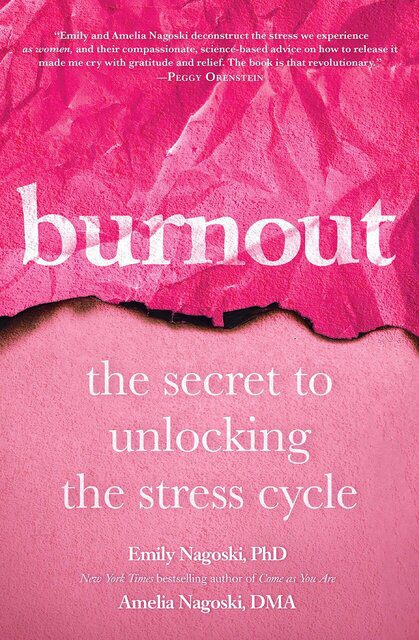The cure for burnout is not “self-care”; it is all of us caring for one another.
In Burnout: The Secret to Unlocking the Stress Cycle, Sisters Emily Nagoski, PhD, and Amelia Nagoski, DMA, share strategies for minimizing stress, managing emotions and living a joyful life.
Burnout was first coined as a technical term by Herbert Freudenberger in 1975, “burnout” was defined by three components:
1. emotional exhaustion—the fatigue that comes from caring too much, for too long;
2. depersonalization—the depletion of empathy, caring, and compassion; and
3. decreased sense of accomplishment—an unconquerable sense of futility: feeling that nothing you do makes any difference.
Emotional exhaustion happens when we get stuck in an emotion and can’t move through the tunnel. In Human Giver Syndrome, the giver isn’t allowed to inconvenience anyone with anything so messy as emotions, so givers are trapped in a situation where they are not free to move through the tunnel. They might even be punished for it.
“Dealing with your stress is a separate process from dealing with the things that cause your stress. To deal with your stress, you have to complete the cycle.”
HUMAN GIVER SYNDROME
In Down Girl: The Logic of Misogyny, philosopher Kate Manne describes a system in which one class of people,7 the “human givers,” are expected to offer their time, attention, affection, and bodies willingly, placidly, to the other class of people, the “human beings.” The implication in these terms is that human beings have a moral obligation to be or express their humanity, while human givers have a moral obligation to give their humanity to the human beings. Guess which one women are
If you’re hiding from your life, you’re past your threshold. You aren’t dealing with either the stress or the stressor. Deal with the stress so you can be well enough to deal with the stressor.
Symptoms of Human Giver Syndrome
• believing you have a moral obligation—that is, you owe it to your partner, your family, the world, or even to yourself—to be pretty, happy, calm, generous, and attentive to the needs of others;
• believing that any failure to be pretty, happy, calm, generous, and attentive makes you a failure as a person;
• believing that your “failure” means you deserve punishment—even going so far as to beat yourself up; and
• believing these are not symptoms, but normal and true ideas.
Human Giver Syndrome is a collection of personal and cultural beliefs and behaviors that insist that some people’s only “meaning in life” comes from being pretty, happy, calm, generous, and attentive to the needs of others.
Stress vs Stressors
Stressors are what activate the stress response in your body. They can be anything you see, hear, smell, touch, taste, or imagine could do you harm. There are external stressors: work, money, family, time, cultural norms and expectations, experiences of discrimination, and so on. And there are less tangible, internal stressors: self-criticism, body image, identity, memories, and The Future. In different ways and to different degrees, all of these things may be interpreted by your body as potential threats.
Stress is the neurological and physiological shift that happens in your body when you encounter one of these threats. It’s an evolutionarily adaptive response that helps us cope with things like, say, being chased by a lion or charged by a hippo.1 When your brain notices the lion (or hippo), it activates a generic “stress response,” a cascade of neurological and hormonal activity that initiates physiological changes to help you survive: epinephrine acts instantly to push blood into your muscles, glucocorticoids keep you going, and endorphins help you ignore how uncomfortable all of this is.
Addressing the cause of the stress doesn’t mean you’ve addressed the stress itself. Your body is soaked in stress juice, just waiting for some cue that you are now safe from the potential threat and can relax into celebration.
Chronic Stress
This is the upside-down world we live in: in most situations in the modern, post-industrial West, the stress itself will kill you faster than the stressor will—unless you do something to complete the stress response cycle. While you’re managing the day’s stressors, your body is managing the day’s stress, and it is absolutely essential to your well-being—the way sleeping and eating are absolutely essential—that you give your body the resources it needs to complete the stress response cycles that have been activated.
We get stuck in the stress response, because we’re stuck in a stress-activating situation. That’s not always bad—it’s only bad when the stress outpaces our capacity to process it. Which, alas, is a lot of the time.
Strategies for dealing with Stress
Exercise
Physical activity is what tells your brain you have successfully survived the threat and now your body is a safe place to live. Physical activity is the single most efficient strategy for completing the stress response cycle.
Breathing.
Deep, slow breaths dow nregulate the stress response—especially when the exhalation is long and slow and goes all the way to the end of the breath, so that your belly contracts. Breathing is most effective when your stress isn’t that high, or when you just need to siphon off the very worst of the stress so that you can get through a difficult situation, after which you’ll do something more hardcore. Also, if you’re living with the aftermath of trauma, simply breathing deeply is the gentlest way to begin unlocking from the trauma, which makes it a great place to start.
Positive Social Interaction
Casual but friendly social interaction is the first external sign that the world is a safe place. People with more acquaintances are happier. Just go buy a cup of coffee and say “Nice day” to the barista. Compliment the lunch lady’s earrings. Reassure your brain that the world is a safe, sane place, and not all people suck. It helps!
Laughter.
Laughing together—and even just reminiscing about the times we’ve laughed together—increases relationship satisfaction. When we laugh, says neuroscientist Sophie Scott, we use an “ancient evolutionary system that mammals have evolved to make and maintain social bonds and regulate emotions.” – Scott, “Why We Laugh.”
“Thirty minutes of anything that works for you: exercise, meditation, creative expression, affection, etc. Because you experience stress every day, you have to build completing the cycle into every day. Make it a priority, like your life depends on it. Because it does.”
Optimism vs Pessimism
Optimism is associated with all kinds of positive outcomes related to mental health, physical health, and relationships. You probably don’t need any more persuasion or instruction on positive reappraisal. You just keep on keeping on—see the silver lining of every cloud and the rainbows of every storm. Do you.
Pessimists, by contrast, don’t always expect good outcomes and may view bad things, if they happen, as symptomatic of larger-scale problems that could have lasting impact.
Struggle is part of the Process
In fact, there is a distinct downside to effort that is too effortless: When a task feels easy, we feel more confident about our ability to perform that task even though we are actually more likely to fail. Novices who are thoroughly incompetent rate themselves as very confident in their ability to do a thing they’ve just learned to do. By contrast, genuine experts know how difficult their work is, so they are realistic about their competence and thus rate their confidence in their own abilities as moderate, even as their performance is, of course, expert-level.
When we’re struggling, we may reach a point of oscillating between frustrated rage and helpless despair. Solution: Choose the right time to give up, which might be now or might be never; either way, the choice puts you back in the driver’s seat.
Finding Meaning
Meaning is the feeling that you “matter in some larger sense. Lives may be experienced as meaningful when they are felt to have significance beyond the trivial or momentary, to have purpose, or to have a coherence that transcends chaos.
Meaning is not constant. Some moments in our lives feel intensely meaningful. Others feel “meaning-neutral”—you’re just running errands or doing chores and it doesn’t matter whether you feel a connection with something larger than yourself. Still others include a strong sense of its absence, moments when we are seeking meaning. We might go too long without experiencing a sense of meaning and we begin to wonder what life even means, or maybe terrible things happen that seem to strip life of all meaning and we ask why. Meaning comes and goes.
“Meaning,” in short, is the nourishing experience of feeling like we’re connected to something larger than ourselves. It helps us thrive when things are going well, and it helps us cope when things go wrong in our lives.”
Research has found that meaning is most likely to come from three kinds of sources:
1. pursuit and achievement of ambitious goals that leave a legacy—as in “finding a cure for HIV” or “making the world a better place for these kids”;
2. service to the divine or other spiritual calling—as in “attaining spiritual liberation and union with Akal” or “glorifying God with my words, thoughts, and deeds”; and
3. loving, emotionally intimate connection with others—as in “raising my kids so they know they’re loved, no matter what” or “loving and supporting my partner with authenticity and kindness.
Synchronicity
You spent the first two years of life assuming that what you felt was what everyone around you felt—checking in with the adults around you to see how they felt, and adopting their feelings as your own. Not by choice; by instinct. If the grown-up holding you is calm and relaxed, then your nervous system knows it can be calm and relaxed, too. If that grown-up is stressed and anxious, then there must be something to be anxious about, so your nervous system puts you in that state, too.
Rest
“Rest” doesn’t just mean sleep—though of course sleep is essential. Rest also includes switching from one type of activity to another. Mental energy, like stress, has a cycle it runs through, an oscillation from task focus to processing and back to task focus. The idea that you can use “grit” or “self-control” to stay focused and productive every minute of every day is not merely incorrect, it is gaslighting, and it is potentially damaging your brain.
Getting the rest your body requires is an act of resistance against the forces that are trying to rig the game and make you helpless. Reclaim rest and you reclaim sovereignty over your own life.
Life in the modern developed world is such that many of us have a vast overabundance of virtually everything…yet often we can’t meet our basic, life-sustaining, physiological needs without feeling guilty, ashamed, lazy, greedy, conflicted, or, at best, defiant.
“Walking away from a task or a problem doesn’t mean you’re “quitting” or giving up. It means you’re recruiting all your brain’s processes for a particular task—including the capabilities that don’t involve your effortful attention.”
• Just because you’ve dealt with a stressor doesn’t mean you’ve dealt with the stress. And you don’t have to wait until all your stressors are dealt with before you deal with your stress. Which is to say, you don’t have to wait for the world to be better before you make your life better—and by making your life better, you make the world better.
• Wellness is not a state of being but a state of action. It is the freedom to move fluidly through the cyclical, oscillating experiences of being human.
Humans are not built to function autonomously; we are built to oscillate from connection to autonomy and back again. Connection—with friends, family, pets, the divine, etc.—is as necessary as food and water.
All the Best in your quest to get Better. Don’t Settle: Live with Passion.



1 Comment
Pingback: 100 Books Reading Challenge 2021 | Lanre Dahunsi